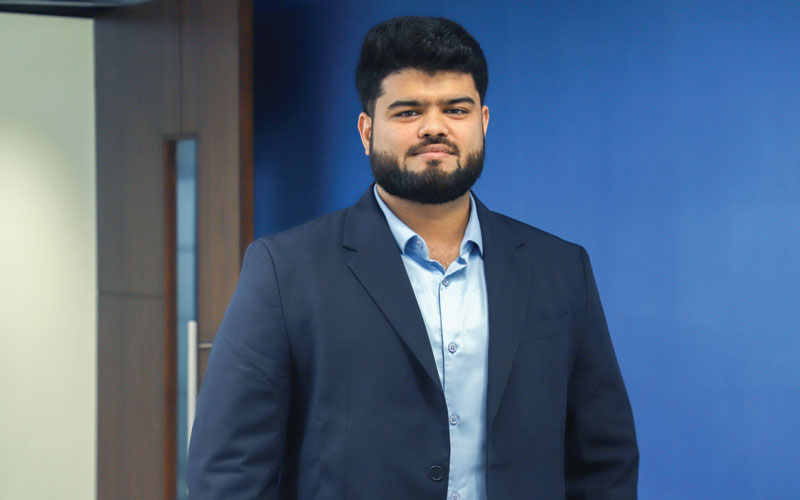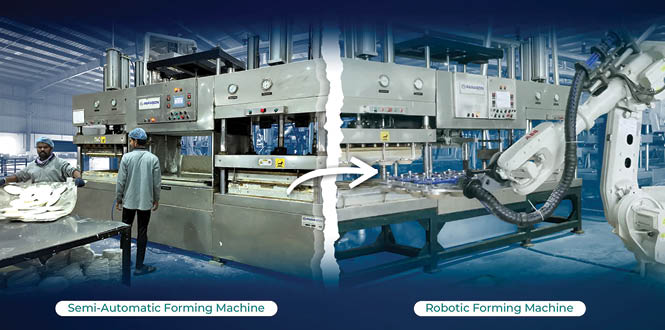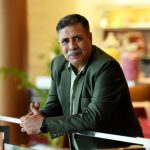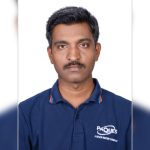Parason has introduced robotic retrofit innovation, upgrading its existing semi-automatic machines with fully robotic modules, to address a growing need of molded fiber industry for higher efficiency, reduced labor dependency, and improved product consistency, delivering up to 30% higher output. In an exclusive interview with Paper Mart, Mr. Madhure S. Desarda, Director, Parason, highlights how this cost-effective innovation supports ESG goals and meets the growing demand for premium biodegradable packaging, setting a new benchmark in the compostable tableware industry.

Paper Mart: The plastic reduction movement has gained momentum through both regulatory action and consumer demand. From your perspective, which force has more directly impacted the momentum around reducing plastic waste? What specific event or market shift prompted Parason’s strategic response to expand into this sector?
Madhure S. Desarda: From Parason’s perspective, regulatory action has been the more direct force accelerating momentum in plastic reduction. Global and national policies—such as India’s ban on single-use plastics (2022), the EU’s Single-Use Plastics Directive (2019), and extended producer responsibility (EPR) mandates—have created urgent compliance needs for manufacturers. These regulations have made alternatives to plastic not just an ethical choice but a legal requirement.
Parason’s strategic response was catalyzed by a shift in both policy and customer sentiment. Around 2019–2020, we observed increasing inquiries from clients seeking to pivot to eco-friendly tableware and molded fiber packaging. This surge, combined with India’s regulatory push, prompted us to expand into pulp molded fiber machinery, leveraging our 50-year legacy in pulping and stock preparation technology.
PM: How does Parason’s offerings balance environmental claims against practical constraints like product performance metrics?
MSD: At Parason, we recognize that environmental credibility must go hand-in-hand with real-world functionality. Our molded fiber forming machines are designed to produce products that meet rigorous performance benchmarks—strength, water/oil resistance, shelf stability—without compromising compostability or biodegradability.
We work closely with material scientists and packaging designers to ensure that outputs from our machines pass the required standards, while also maintaining competitive performance against plastics in terms of durability and handling. Our machines allow adjustments in wall thickness, mold temperature, and drying time to optimize both environmental compliance and end-use quality.
Watch: In Pursuit of Lesser Water Footprint
PM: The terms “biodegradable” and “compostable” carry distinct certification requirements yet are used interchangeably in the marketplace. How does Parason address this distinction when developing machines for this sector, and what impact has this had on your client’s manufacturing processes?
MSD: We are highly conscious of the regulatory and functional distinctions between ‘biodegradable’ and ‘compostable.’ Compostable materials must decompose under specific conditions within a defined timeframe and are subject to third-party certification (e.g., BPI, TÜV Austria). Biodegradable claims, by contrast, are often less regulated and can lead to greenwashing.
To address this, we engineer our machines to process certified compostable pulp blends, such as bagasse, bamboo fiber, and recycled paper, ensuring compatibility with global compostability and food safety standards. Beyond machine design, we work closely with clients to help them understand, apply for, and comply with certifications such as BRC, US FDA, ISO, and RS Migration Tests. We also support certification-readiness at the facility level, positioning our clients for both domestic and export success.
This consultative approach has strengthened client confidence, minimized regulatory setbacks, and accelerated market access for certified compostable tableware products.

Our latest innovation, newly developed molds that enable trim-free products, has enhanced production efficiency by minimizing material waste and eliminating post-processing steps.
PM: Parason recently introduced a robotic retrofit solution to upgrade semi-automatic molded fiber machines. What gap does this innovation fill, and how does it benefit manufacturers?
MSD: The introduction of Parason’s robotic retrofit innovation addresses a growing need in the molded fiber industry for higher efficiency, reduced labor dependency, and improved product consistency without the capital burden of installing an entirely new production line.
By retrofitting existing semi-automatic machines with our fully robotic module, manufacturers can immediately experience up to 30% increase in output, significant reduction in human effort, and
zero wrinkles or defects in final products. The system ensures consistent, high-quality results
with minimal operational intervention.
What makes this innovation truly impactful is its ability to transform legacy setups into smart manufacturing lines, enabling businesses to scale sustainably and competitively. It’s a cost-effective automation leap that aligns with both ESG goals and market demand for premium biodegradable packaging.
At Parason, innovation is not just about building new machines, it’s about creating smarter ways to upgrade, optimize, and future-proof the pulp and paper industry. From automation to sustainability, we remain committed to delivering technologies that help our clients lead in a changing world.
PM: Innovation in technology continues to reshape production capabilities. What specific technological advancement has most significantly enhanced Parason’s competitive position in this sector?
MSD: The most transformative advancement for Parason has been the development of fully automated forming, pressing, and drying units for molded fiber products. This includes Skid-based systems that offer flexibility and scalability, as well as high-precision forming molds with temperature control.
Our latest innovation, newly developed molds that enable trim-free products, has further enhanced production efficiency by minimizing material waste and eliminating post-processing steps.
Automation has significantly improved our clients’ OEE (Overall Equipment Effectiveness), reduced labor costs, and ensured consistent product quality. These advancements have positioned Parason as a competitive supplier both in domestic markets and in stringent global export environments.

PM: Market adoption of biodegradable tableware appears driven by multiple stakeholders. Between corporate sustainability initiatives or B2B clients, consumer preferences, and regulatory frameworks, which segment has most meaningfully influenced the adoption in general and your sales growth in particular, and how has this mix evolved in the last few years?
MSD: While consumer awareness plays a role, Parason has seen regulatory frameworks and B2B client sustainability mandates as the most meaningful drivers of both market adoption and our sales growth. FMCG companies, QSR chains, and packaging vendors are under mounting pressure to replace plastic in their supply chains.
In recent years, however, corporate ESG (Environmental, Social, Governance) commitments have taken center stage. These commitments have translated into multi-year purchase contracts for molded fiber packaging solutions, giving manufacturers confidence to invest in new machinery. Parason’s sales pipeline increasingly reflects this shift toward B2B sustainability-driven procurement.

Within India, Tier 2 and Tier 3 cities have shown strong demand for decentralized molded fiber units, catering to local food service and temple packaging needs. This trend aligns with India’s broader push for Atmanirbhar Bharat and rural industrialization.
PM: The adoption of biodegradable tableware shows uneven development in terms of regions, industries, or buyer personas. Have you noticed any unexpected growth pockets that are embracing biodegradable tableware faster than others? Which specific markets or customer segments have driven growth for your company.
MSD: We’ve seen surprising acceleration in sectors like electronics packaging and cosmetics, where molded fiber is being adopted for high-value, brand-sensitive applications. Additionally, Middle Eastern and South American markets—often overlooked in sustainability discussions—are emerging as strong growth zones due to increasing regulatory alignment with EU norms.
Within India, Tier 2 and Tier 3 cities have shown strong demand for decentralized molded fiber units catering to local food service and temple packaging needs. This trend aligns with India’s broader push for Atmanirbhar Bharat and rural industrialization.
PM: Product development faces a fundamental tension between replicating plastic’s performance characteristics and redefining consumer expectations. Are Parason’s machines primarily focused on matching conventional plastic properties, or are you investing in shifting market expectations about what tableware should deliver?
MSD: Parason’s approach is twofold. Our machines are engineered to replicate key performance traits of plastic, such as strength, shape retention, and water resistance. But we are equally focused on redefining market expectations by educating clients and end-users that eco-friendly tableware can be aesthetically appealing, safe, and fit for purpose without mimicking plastic in all respects.
We also collaborate on material innovations, such as integrating food-safe coatings or using hybrid fibers, to offer a new standard of biodegradable excellence. Notably, our collaboration under the IGSTC project with a German partner is focused on pioneering next-generation molded fiber technologies that balance sustainability with performance. This joint research initiative reinforces our vision of setting a new benchmark in the global tableware industry.
Also Read: CHUK: Catering to Global Demand With Indian Compostable Tableware Solutions
PM: India’s manufacturing sector shows potential for global export leadership in biodegradable alternatives. How are Parasons’ machines positioned to manufacture products that compete internationally?
MSD: Parason is ideally positioned to help India become a global hub for biodegradable tableware and packaging. Our machines are export-compliant, meeting industry standards with CE, UL certifications customizable for different fiber sources, from sugarcane bagasse to bamboo pulp, and backed by global service networks across the USA, Brazil, and Europe.
We’ve already exported complete systems to USA, Brazil, Kenya, Australia, UK, demonstrating that India’s manufacturing capabilities—when coupled with Parason’s engineering strength—can compete globally in quality, cost-efficiency, and innovation.



